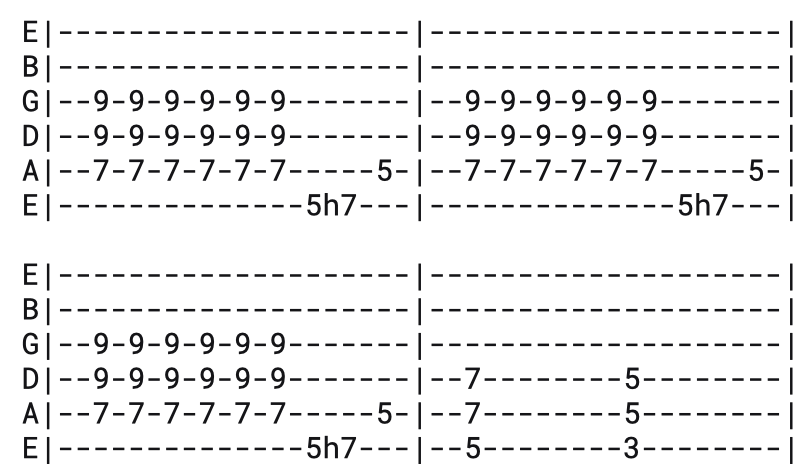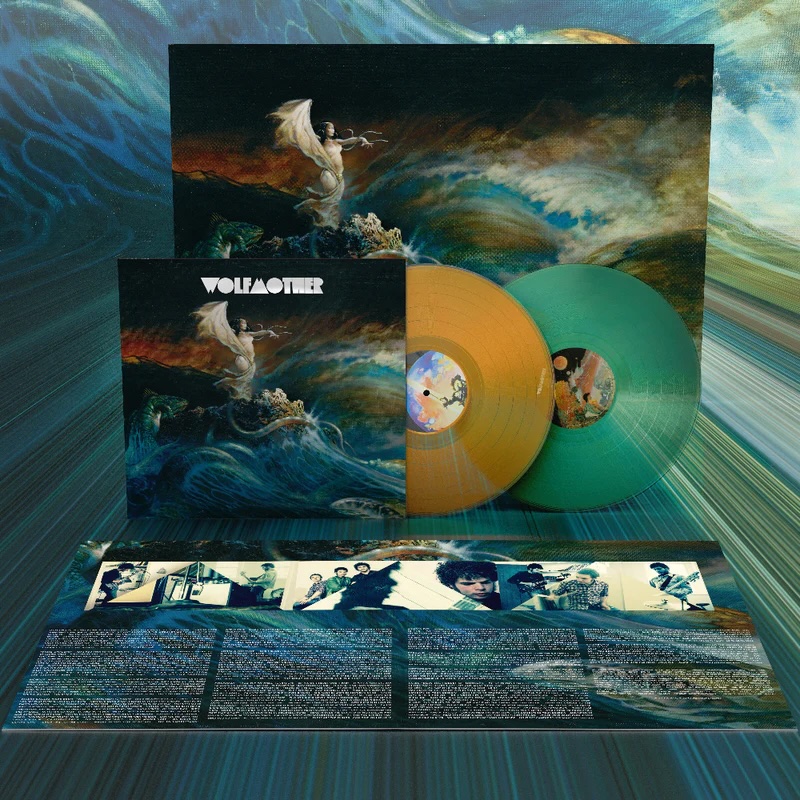A Vinyl Remaster Of Wolfmother’s 2005 Debut Does Well To Slow Their Ongoing Fade
THE DERIVATIVE 2000s HARD ROCKERS FROM DOWN UNDER HAVE NEVER SOUNDED BETTER — FOR WHAT IT’S WORTH
The Late Show is dead. Long live The Late Show. Last week, CBS announced that its flagship late-night show — launched by David Letterman in 1993 after his departure from NBC’s Late Night, and hosted by Stephen Colbert since 2015 — will end by May of next year. Not just Colbert’s version, which was never quite my bag, but the whole damn thing. Officially, it’s a cost-cutting move, but plenty see political pressure behind it. For me, it’s mostly a marker of time.
As a teenager in the mid-2000s, watching “Dave” night after night was a major bonding ritual between me and my dad, Scott, who I miss very much. A big part of that was the music — and given the era, that meant the second wave of the “garage rock revival”: the Strokes and the White Stripes giving way to second- or third-tier acts.
One night in 2006, just days after my 14th birthday, an unknown-to-me New South Wales hard rock trio fronted by a vaguely androgynous singer-guitarist barreled through their song “Woman” on Letterman. I sprinted to my Costco-bought Yamaha Strat copy and 10-watt amp, booted up Ultimate Guitar, and taught myself the riff.
In the years since, I never followed Wolfmother’s output. I never formed an emotional connection with the band. (Which either makes me the best or worst person to write this review.) I know they released 2009’s Cosmic Egg, produced by Alan Moulder; 2014’s New Crown, a self-released, Stockdale-produced set; and 2016’s Victorious, produced by Brendan O’Brien — all modest updates to the original template: a heavy-handed blend of blunt-force classic rock signifiers via Sabbath and Zep. On the main: if you’ve heard one, you’ve heard them all.
But to this day, whenever I pick up a guitar, I tend to absentmindedly noodle:
 Which, barring a brain injury, I’m set to take to my grave — “Woman” is permanently lodged in my muscle memory. Funny what sticks with you in this life.
Which, barring a brain injury, I’m set to take to my grave — “Woman” is permanently lodged in my muscle memory. Funny what sticks with you in this life.
And about that derivativeness: it really can’t be overstated. Their closest analog might be fellow Australians Jet, who broke out in 2003 with Get Born and its lead single, “Are You Gonna Be My Girl?” — a shameless Frankensteining of Iggy Pop, AC/DC, the Rolling Stones, and more. (Pitchfork’s 0.0 review of Jet’s 2006 follow-up, Shine On — consisting of nothing but a single, indelible YouTube embed — says everything about how the cognoscenti viewed this style.)
After the debut, Stockdale cycled through rhythm sections for years, eventually reducing Wolfmother to a solo project. The last two self-releases — from 2019 and 2021 — were dispiritingly titled Rock ’n’ Roll Baby and Rock Out, respectively, and sound similarly uninspired.
Anything to slow that ongoing fade helps. And so: enter Interscope.
To mark the album’s 20th anniversary, Wolfmother is now the 21st release in the Interscope Vinyl Collective: a double LP cut at 45 RPM from 24-bit/192kHz flat masters by Levi Seitz at Black Belt Mastering, pressed at RTI on translucent orange and emerald vinyl, and housed in a deluxe foil-board gatefold jacket with rice paper inner sleeves. It also includes a 2′×3′ poster of Frank Frazetta’s original cover art. The pressing is limited to 3,000 individually numbered copies.
Before we spun the reissue, Tracking Angle editor-in-chief Michael Fremer and I compared it to the original digital release — streamed as 44.1kHz/16-bit FLAC — in his reference-grade listening room. Which, in fact, is not Fremer's "basement," as I've absentmindedly written in the past — and now I won't forget it:
(Oh my, I need to lose about 10!_ed.)
The takeaway? Their slow fade is understandable — but they weren’t a bad band, at least not at the beginning. On the original, they strike a dirty yet safe tone. “Dimension” screams in but never quite kicks as hard as it wants to, though it still works. “Woman” remains a strong single — it reached No. 7 on Billboard’s Mainstream Rock chart and won the 2007 Grammy for Best Hard Rock Performance. “Pyramid” has a satisfying heft and plumpness.
“Apple Tree,” for my money, is unlistenable — a punkish, stop-start mess and the most blatant Jack White ripoff on the disc, further proof of how large he loomed over mainstream rock in 2006. The vocal production doesn’t help: Stockdale’s Robert Plant–style wail gets run through a Strokes-like lo-fi filter and shoved high in the mix, making it even more grating.
Then we put on the new vinyl remaster — and it was like night and day. On “Dimension,” the difference is immediate. The vocals don’t grate nearly as much; they sit more naturally in the mix and feel less boxed-in. Everything sounds fatter and more present, like you’re finally hearing it with the lid off. There’s vocal bleed in the left channel, which adds a touch of realism, and the drums sound more like actual drums — less cardboard, more air. Details that were smeared on the original now register with just enough clarity to justify the format.
“White Unicorn” feels much chiller — not because anything changed structurally, but because the remaster gives it space to breathe. The main riff has a sunshiney chewiness that wasn’t as obvious before. It’s like Sunflower-era Beach Boys seeped into the genre pool. There’s even a beautiful, unmistakably Who-like section I somehow missed before. Strangely, this version makes their record collections seem deeper — Fremer even pointed out a possible Mountain influence I hadn’t noticed, but now can’t unhear.
“Woman,” finally unburdened by the vocal mix, hits harder than ever. Stockdale’s voice still cuts, but there’s enough air around it that it doesn’t overwhelm. “Colossal,” too, lives up to its name. Even “Mind’s Eye,” one of the album’s more prog-leaning moments, benefits from the added clarity — the Mellotron textures and layered guitars actually register now, instead of collapsing into each other. Even “Apple Tree” benefits from the pruning.
 If you love this record, it’s probably because you haven’t spent much time with the records that inspired it. But that doesn’t make your love wrong. There are far worse things to do with your time than start a rock band. Still, after all that fuzz and bombast, Fremer and I couldn’t help but reach for something cooler: Elephant, the White Stripes’ 2003 masterpiece, spun from Analogue Productions’ UHQR 0019-45 — a 200-gram Clarity Vinyl 2LP cut at 45 RPM and pressed at QRP — on his $100,000 Astellar-based playback system currently in for review.
If you love this record, it’s probably because you haven’t spent much time with the records that inspired it. But that doesn’t make your love wrong. There are far worse things to do with your time than start a rock band. Still, after all that fuzz and bombast, Fremer and I couldn’t help but reach for something cooler: Elephant, the White Stripes’ 2003 masterpiece, spun from Analogue Productions’ UHQR 0019-45 — a 200-gram Clarity Vinyl 2LP cut at 45 RPM and pressed at QRP — on his $100,000 Astellar-based playback system currently in for review.
I insisted we cue up “Ball and Biscuit,” the slow-burning blues scorcher that rewired my brain around the same time I first saw Wolfmother on Letterman. It still hit like it always has: raw, swaggering, perfect rock music. Wolfmother still feels like the diet version — still fizzy, still fun, just lacking the bite. Which, again, still beats no rock music at all. And this new Interscope pressing, unquestionably, is how this blast of Aussie aughts rock should be heard.











































.png)








